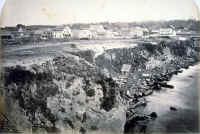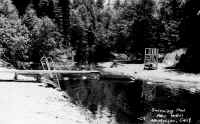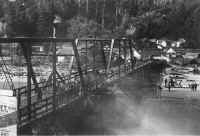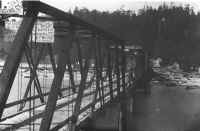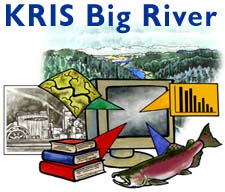Bibliography Background About KRIS
Big River History: Social
Photos provided courtesy of the Mendocino Historical Society and the Held Poage Memorial Home and Research Library. From the collection of Robert Lee. The Bancroft Library at U.C Berkeley also allowed use of a few select photos of the area from their Watkins collection. Further use of photos must be approved by the Mendocino Historical Society or the Bancroft Library. Click on the images to view at full size.
The following excerpts are from Mendocino City, A daily Journal 1852-1938 by W. Francis Jackson. Mendocino Historical Research, Inc. Copyrighted.
August 11, 1857 George Huber and Edward Lane paid their poll tax, $3.00 each. (This amount was withheld from their wages by the Company. Their compensation for working was $1.73 per day, a monthly salary of $45.00)
April 30, 1894 Charles A. Perkins, logging contractor, dispatched two wagons to the Lower Ranch for potatoes. (Many such ranches dotted the river, raising staples for the various logging camps and grain for the work animals)
June 22, 1900 927, number of persons living in Mendocino according to census taker O. L. Stanley's final report. (233 Portuguese were registered as inhabitants, principally from Portugal, Azore and Western Island in the Azore Island chain.
June 7, 1903 Pepperwood Camp #756. Woodman of the World, WOW. Attended graveside services for H. C. Tanner at the Evergreen Cemetery. (The order had been instituted in July the preceding year with M. Garrison being the leading officer)
June 23, 1909 John S. Ross family escaped to the river for summer camping. (Dozens of local families made this their seasonal activity. Many of the sites were passed down to the next generation. Kidwell Gulch, named for a family, was one such site)
December 21, 1909 Fred Seymour arrested for seining salmon on the river by Game Warden A. L. Reynolds. (This was the first time that he had been arrested, and due to his age, he was let off with a minimum fine of $10.00.)
June 19, 1911 Jack London and his wife arrived in town. (They were entertained by the local business people. He was on an assignment to write on "The Resources of the North Bay counties". They also toured the mill and rode on the Maru.)
August 24, 1912 News item: "3,000 pounds of huckleberries were sent to San Francisco during the week". (The only capital needed to harvest these berries was a tin pail and two hands to pick the fruit growing on thousands of acres)
March 22, 1913 Five were fined for fishing above tidewater during the closed season, paying $25.00 each. (Judge Wm. Wallace levied the fine at the local Justice Court. Fined were: Andrew Metti, John and James Borginia, John Gurina and John Calpella)
October 23, 1925 Believed to be ancient Indian burial grounds were uncovered on the Flat. (A crew of men removing sand to be used for a roadbed, dug up beads, arrowheads, bones and blankets near the former Rancheria)
May 17, 1930 Talking pictures arrived in town when the Desert Song was presented at the new Coast Theater. (This show house was formerly known as Bishop's theater. New owner and proprietor, Mr. Pollock, had refurbished the building for talking pictures)
June 11, 1930 U.S. census report recorded that 1989 persons lived in the Big River Township, a drop of 1141 persons since the 1920 report when there were 3130 inhabitants living in the township.
May 9, 1932 Company officials filed Affidavits in Superior Court absolving themselves of having started the Comptche fire. (This forest fire had its beginning on Company lands, starting at three separate locations, which became a single fire)
Infrastructure - railroads, boats, bridges, etc.
Events - floods, storms, shipwrecks, etc
Logging / Mills - operations and events at mills, logging activities
Also see, Big River Was Dammed (excerpts) and Fish stories from the past
